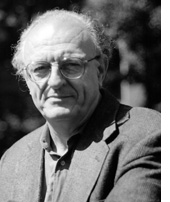
Fall 1998
![]()
Covering black holes, fossil worms, and a cure for cancer
![]()
![]()
Soundings is a publication of the School of Humanities and Social Science at MIT
Comments and questions to www-shss@mit.edu
Covering black holes, fossil worms, and a cure for cancer
 "I
was pretty sure I didn't want to do it," says Boyce
Rensberger, speaking of the directorship of the Knight Science
Journalism Fellowships, a post in the School of Humanities and Social
Science he assumed this past summer. "I was having too good a time at
The Washington Post. But the idea grew on me. The more I thought about
it, the more I thought it would be a wonderful new challenge to try to
upgrade the quality of science writing across the country."
"I
was pretty sure I didn't want to do it," says Boyce
Rensberger, speaking of the directorship of the Knight Science
Journalism Fellowships, a post in the School of Humanities and Social
Science he assumed this past summer. "I was having too good a time at
The Washington Post. But the idea grew on me. The more I thought about
it, the more I thought it would be a wonderful new challenge to try to
upgrade the quality of science writing across the country."
Now well past the demurral stage, Rensberger is focusing fulltime on the Fellowships' present and future direction. Aside from offering science writers a chance to elude daily deadlines and hone the craft of writing, the program gives Fellows an opportunity to thicken their Rolodexes and steeps them in issues central to the profession: how to deal with uncertainty and conflict in science, advocacy groups, junk science, and ethical dilemmas, for example. "My goal is to have the Fellows gain a deeper understanding of the cutting-edge in scientific research and a familiarity with the culture of science - how scientists make decisions regarding good and bad evidence and how scientific progress is made," says Rensberger.
With long stints at The New York Times and The Washington Post behind him, Rensberger, 56, arrived at the Knight Fellowships with credentials spanning more than 30 years. Author of four science books - most recently Life Itself: Exploring the Realm of the Living Cell - he was also senior editor of Science 81-84 magazine and head writer of the PBS science series for children, "3-2-1-Contact!" He has been honored with the Alicia Patterson Fellowship, during which he studied human evolution and wildlife biology in East Africa, and is a two-time winner of the American Academy for the Advancement of Science Journalism Award. He also co-directs the summer Science Writing Fellowships Program at the Marine Biological Laboratory in Woods Hole, Massachusetts, a position he has held for seven years.
Rensberger succeeded Victor K. McElheny, founding director of the Knight Fellowships, on his retirement. McElheny established the mid-career program for science journalists at MIT in 1982, capping a career in science journalism with The New York Times, The Boston Globe, Charlotte Observer, Science magazine, and a directorship of the Banbury Center at Cold Spring Harbor Laboratory.
Commenting on his goals as the new head of the Knight Fellowships, Rensberger says he would like to create an annual conference targeted to high-level news editors. "Many science writers are beating their heads against stone editors, who usually have been promoted from covering politics or the foreign desk or something pretty far from science. They don't really understand much about science or technology, but they're making decisions about the number of science writers needed at the organization and how to play the stories," he says. "I'd like to help them get smarter about how to make better decisions."
![]()
Copyright © 2000 Massachusetts
Institute of Technology